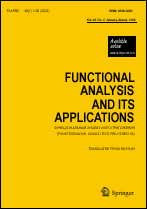|
This article is cited in 19 scientific papers (total in 19 papers)
Functional Equations and Weierstrass Sigma-Functions
A. A. Illarionov
Khabarovsk Division of the Institute of Applied Mathematics, Far Eastern Branch of the Russian Academy of Sciences, Khabarovsk, Russia
Abstract:
It is proved that if an entire function $f\colon\mathbb{C}\to\mathbb{C}$ satisfies an equation of the form $f(x+y) f(x-y) = \alpha_1(x)\beta_1(y)+ \alpha_2(x)\beta_2(y) + \alpha_3(x)\beta_3(y)$, $x,y\in \mathbb{C}$, for some $\alpha_j,\beta_j\colon\mathbb{C}\to\mathbb{C}$ and there exist no $\tilde \alpha_j$ and $\tilde\beta_j$ for which
$f(x+y) f(x-y) = \tilde\alpha_1(x)\tilde\beta_1(y)+ \tilde\alpha_2(x)\tilde\beta_2(y)$, then
$f(z) = \exp(Az^2+ Bz + C) \cdot \sigma_\Gamma (z-z_1)\cdot \sigma_\Gamma (z-z_2)$, where $\Gamma$ is a lattice in $\mathbb{C}$; $\sigma_\Gamma$ is the Weierstrass sigma-function associated with $\Gamma$; $A,B,C,z_1,z_2\in\mathbb{C}$;
and $z_1-z_2\notin (\frac{1}{2}\Gamma)\setminus \Gamma$.
Keywords:
functional equation, Weierstrass sigma-function, elliptic function, addition theorem, trilinear functional equation.
Received: 16.10.2016
Citation:
A. A. Illarionov, “Functional Equations and Weierstrass Sigma-Functions”, Funktsional. Anal. i Prilozhen., 50:4 (2016), 43–54; Funct. Anal. Appl., 50:4 (2016), 281–290
Linking options:
https://www.mathnet.ru/eng/faa3253https://doi.org/10.4213/faa3253 https://www.mathnet.ru/eng/faa/v50/i4/p43
|


|




 Contact us:
Contact us: Terms of Use
Terms of Use
 Registration to the website
Registration to the website Logotypes
Logotypes








 Citation in format
Citation in format 
